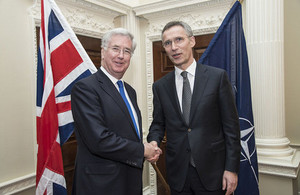Publication of Annual Report 2016 on the National Security Strategy & Strategic Defence & Security Review 2015
Acting UK Ambassador to NATO, Paul Johnston, announces how the UK’s commitments to NATO in last year’s SDSR are being realised

UK Defence Secretary, Michael Fallon, with NATO Secretary General, Jens Stoltenberg
On 7 December, the UK Government published its first Annual Report to Parliament on the 2015 National Security Strategy and Strategic Defence & Security Review (SDSR).
The 2015 SDSR set out our vision of a secure and prosperous United Kingdom, with global reach and influence. It established three overarching National Security Objectives: ‘protect our people’; ‘project our global influence’ and ‘promote our prosperity’.
Nothing that has happened since has changed those fundamental objectives, nor the importance of our NATO membership to securing them: if anything, the latter has increased.
The Annual Report sets out progress on achieving our objectives, many of which are central to our Alliance commitments. For example, the Government:
-
is investing in the renewal of the UK’s independent nuclear deterrent;
-
has launched a new National Cyber Security Centre; and
-
has expanded the UK’s diplomatic and defence engagement networks.
We have created a joint FCO/MOD department to shape our policy on NATO and European security, mirroring the joint FCO/MOD delegation we have in NATO.
Since the SDSR was published in November 2015, the Government has also renewed its commitment to spend 2% of GDP on defence (one of only 4 European Allies to meet this NATO target), with a real terms increase of 0.5% a year in the defence budget until 2020-21, and 0.7% of GNI spent on overseas development, also crucial to long-term national security.
We are the only NATO Ally to do 2% and 0.7%. We are also one of the few Allies to be spending more than 20% of our budget on equipment, the other NATO target, including new aircraft carriers, maritime patrol aircraft and fighter jets.
We have also:
-
agreed to deploy a battalion to Estonia and an infantry company to Poland, strengthening NATO’s Enhanced Forward Presence;
-
increased our military presence in Iraq helping to train Iraqi forces, which NATO will also be contributing to from next month;
-
renewed our participation in joint naval operations to tackle illegal migration in the Mediterranean;
-
decided to deploy UK fighter aircraft to contributing to the NATO Southern Air Policing task in Romania;
-
helped remove 500 tonnes of chemical weapons precursors from Libya;
-
reiterated its commitment to double the number of UK troops on UN peace-keeping missions;
As the Annual Report describes, there have been changes to the international environment since 2015, including the UK’s decision to leave the European Union.
But the main threats to our security remain: state-based threats; terrorism and extremism; cyber attacks from state and non-state actors; and renewed challenges to the rules-based international order. And therefore the central role which the SDSR gave to our Alliance membership and the contributions we make to NATO remain also.